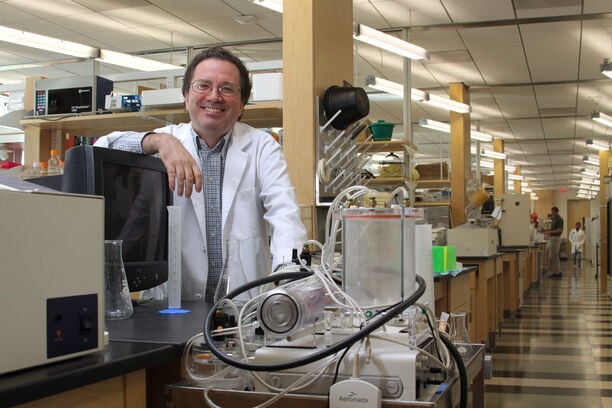A UA research center has received a $15.3 million grant to study Hispanic children’s susceptibility to asthma in Tucson, compared to Nogales, Sonora, where it is much less prevalent.
The study will enroll 250 Mexican-American pregnant women in Tucson, and 250 Mexican pregnant women in Sonora and evaluate them and their newborns until they are 5, said Dr. Fernando Martinez, director of the University of Arizona Health Sciences Asthma and Airway Disease Research Center. Martinez is a principal investigator for the project.
“We have a very significant asthma epidemic in the United States, and many children who develop asthma can be burdened for a lifetime. My goal is to prevent asthma in children by building their immune system,” Martinez said.
About 25 personnel, including physicians, scientists and staff will work on the Binational Early Asthma and Microbiome Study, or BEAMS, which will examine how the “hygiene hypothesis” affects the children and their risk of asthma.
The hygiene hypothesis suggests reduced exposure to germs keeps a child’s immune system from developing the ability to naturally fight infectious organisms, said Martinez.
“Paradoxically, in the middle of all the poverty and underdevelopment in many barrios and colonias in Nogales, Sonora, there is less asthma,” he said. “We want to learn which bacteria children in Nogales, Sonora, are exposed to that Tucson children are not exposed to that leads to asthma.”
“The main problem with children with asthma is that their immune system overreacts to germs that it should learn to modulate its responses. The common cold or allergens can send children with asthma to the hospital,” said Martinez. “We have learned that bacteria in early life will teach the immune system not to overreact,” he said.
“There is four times less asthma in Nogales, Sonora, than here, and our studies show the main reason is because, although children in Nogales, Sonora, are exposed to harmful bacteria that cause many infections, they are also exposed to a lot of protective bacteria that train their immune system to distinguish between dangerous and innocuous microbes,” Martinez said. He said a study of Nogales, Arizona, teens, ages 13 and 14, showed 16% have asthma, compared to 4% to 6% in the same age group in Nogales, Sonora. Researchers also know that Mexican nationals who come to the United States have less asthma than Mexican-Americans.
Early origins
The BEAMS investigation seeks to provide a better understanding of the early origins of asthma and to offer new asthma prevention strategies to improve respiratory health for the Mexican-American community in Southern Arizona, and potentially for all in the United States.
In the study, blood and stool samples will be collected from the pregnant women before giving birth, and at the time of the birth of their child a sample of blood will be taken from the umbilical cord. In addition to blood samples, stool samples and throat cultures will be collected over the years from the children only. Data also will include the child’s diet, illnesses, development and vaccination records. Environmental samples to be collected from the homes include dust and water.
“One of the reasons why it is so important for us to be a Hispanic-Serving Institution is because our unique location in the Sonoran Desert creates incredible opportunities for transborder research and collaboration that could have worldwide benefits,” said UA President Robert C. Robbins in a news release.
The UA was federally recognized in 2018 as a Hispanic-Serving Institution, which includes that 25% of undergraduate full-time equivalency students are Hispanic.
“Asthma is the most common noncommunicable disease among children, and Dr. Martinez’s research could have far-reaching impact for our most vulnerable populations. I am very excited to follow the results of this study to better understand what causes asthma and to develop therapies that will provide respiratory relief for our borderlands region and nearly 340 million people worldwide,” said Robbins.
Pandemic delayed enrollments
Martinez said enrollment of pregnant women for the study will begin in August after being halted because of COVID-19. Enrollment is expected to be completed by August 2023 and will be done through Tucson Medical Center and El Rio Health in Tucson and Secretaria de Salud de Sonora in Nogales, Sonora. The study was funded by the federal agency National Institute of Allergy and Infectious Diseases.
Dr. Donata Vercelli, also a principal investigator in the study and associate director of the Asthma and Airway Disease Research Center, said: “We are going to do something absolutely novel and, to some extent, revolutionary. We will have a microbiological picture of whatever is happening in the lives of these children and their mothers at very high resolution,” she said in a news release.

Dr. Donata Vercelli, associate director, UA Health Sciences Asthma and Airway Disease Research Center.
Other BEAMS principal investigators include Anne L. Wright, a UA pediatrics professor specializing in pulmonology, allergy and immunology; Dr. Cecilia Rosales, associate dean for community engagement and outreach at the UA Mel and Enid Zuckerman College of Public Health; and Susan Lynch, professor and director of the Benioff Center for Microbiome Medicine at the University of California, San Francisco.
In Mexico, BEAMS principal investigator is Dr. Gudelia Rangel Gomez, professor of epidemiology from El Colegio de la Frontera Norte and Dr. Mercedes Gameros Mercado, director of Centro de Salud of the Secretaria de Salud de Sonora, who is serving as the field coordinator in Sonora.





